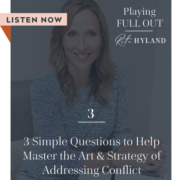From Disappointment to Power: Mastering the Art of Bouncing Back

Listen to the full podcast episode to learn about the science-backed practice that has not only changed my life but also the lives of countless people over the last two decades. This is something you can’t ignore if you want to achieve that great goal you identified for this year and write your new future.
Hi friend! How do you bounce back after people let you down? When a family member, boss, organization, or even institution disappoints you? Recently, I’ve been hearing a lot in my conversations about people letting us down and the ongoing fallout of those disappointments.
In this episode, I’m sharing the four-step process to understand your disappointment and help you manage it so you can have what I call a good bounce-back rate. That is, the time between the disappointment and getting back to your centered and best self. Whether you’ve been recently let down or are preparing for future challenges, these steps will guide you to navigate and recover from disappointments gracefully and protect your well-being so that you don’t suffer or becoming hardened by the initial disappointment.
After all, the worst thing that can happen after someone else’s disappointing behavior is that we become or play smaller.
Understanding Disappointment
Disappointment is a natural emotional response when our reality does not align with our expectations. Whether it’s a missed opportunity, a betrayal, or an unforeseen challenge, disappointments commonly catch us off guard.
For example, a client of mine recently discovered that another executive officer had secretly set up multiple fake businesses on the company ledger. The leader had been stealing several million dollars from the company over the last few years. She was completely blindsided by this revelation. Not only had she been let down but she also felt violated, realizing she had unknowingly facilitated some of his altercations.
The Four Archetypes of Disappointment Responders
The feeling of disappointment can be unsettling and can really trip us up. However, by understanding and recognizing our default response to disappointment, we can proactively navigate those emotions more effectively before they hijack us.
Here are the four general responses I see when it comes to disappointment:
- Retaliator
The Retaliator wants to get even. When someone disappoints or hurts them, they feel compelled to make the other person feel hurt as they have. This approach unfortunately drains valuable energy, keeping the individual stuck in anger and ultimately does more harm than good.
- Fixer
The Fixer believes they are the one that can “fix” or change the person who disappointed them. They may invest inordinate time trying to change the other person’s behavior. This is often seen in in relationships where one person hopes that the disappointment is a one-time event and not a reflection of the others values or lack of care or concern for them. Despite this good intention, this often leads to more repeated disappointment and exhaustion.
- Self-Protector
In response to being hurt, the Self-protector builds walls to prevent future disappointment. They create rigid rules, withdraw trust, and become hardened. While this may feel like safety for them, it ultimately limits connection and vulnerability.
- Self-Actualized Leader
This is the most evolved response. The self-actualized leader acknowledges disappointment, processes his emotions, actively works to manage their emotions, and quickly returns to their centered and best self.
Four Steps to Reclaim Your Power After Disappointment
Now that we understand the disappointment and its common responses, let’s discuss how to move through it effectively and empower yourself after feeling let down.
Step 1: Acknowledge the Disappointment
Pretending something isn’t disappointing won’t make it go away. You have to feel it to heal it. Instead of constantly avoiding, allow yourself to express your feelings. Write about them, talk to someone, or process your feelings in whatever way feels right. The more you acknowledge your emotions, the less power they hold over you.
Step 2: Don’t Make it Mean Something
One of the biggest mistakes we make is assigning meaning to a disappointment that isn’t there in the first place. If someone lets you down, it doesn’t necessarily mean you aren’t good enough, valuable, or worthy. It also doesn’t mean that everyone of a certain group or identity is that way. Remember, people’s actions are shaped by their own experiences, not yours. Avoid making assumptions and resist the urge to take things personally.
Step 3: Reclaim Your Mental Space
Ask yourself this question: “What can I do to stop this from taking up more real estate in my mind?” The disappointment has already taken something from you— don’t let it take more. Reclaim your power by shifting your focus toward what truly matters: your well-being, your priorities, and your future.
Step 4: Start From Where You Are Now
The most powerful phrase I tell myself is: “Start from where I am now.” This simple shift brings you back to the present moment, allowing you to move forward without being weighed down by the past. What’s done is done; you need to accept it, and the best thing you can do is decide how to take charge of your response moving forward.
Bonus: The Power of Letting Go
I do this anytime I’m not at peace when I feel irritated or disappointed by someone. In my mind, I wish the other well. Sending them with love is freeing and cuts the cords of disappointment or irritation. And in return, you also set yourself free because you can’t be angry and give love at the same time.
Cultivating Resilience and Inner Peace
Disappointment will come whether we like it or not, but you have the power to determine how much it impacts you. How fast you bounce back. Acknowledge it, process it, and choose not to give it more energy than necessary. You are too important and too needed to stay stuck in disappointment.
What matters is your state of mind and how quickly you can bounce back to your center because you are always attracting your current state to you.
In this episode, I share how:
- Understanding disappointment and its impact helps you manage emotions and control the power you give it.
- To process your response to disappointment and consciously choose to move forward.
- To reclaim your power and protect your peace by intentionally shifting your mindset, setting boundaries, and returning to your most grounded self.
Resources and related episodes:
- Tune in to the previous episode, The Must-Have Skill That Separates Highly Successful Leaders From the Rest
- Listen to Leading From a Heart at Peace
- If you’d like to be notified of when new podcast episodes are released, you can do so here: Playing Full Out
- Learn more about the Inside Out Method
- Connect with Rita on LinkedIn
Subscribe on Apple Podcasts for more tips, tools, and inspiration to lead the optimal vision of your life, love, and leadership. Remember, a half version of you is not enough. The world needs the fullest version of you at play.
___
About Rita Hyland
With over 20 years of experience as an executive and leadership coach, Rita helps leaders — emerging and established — excel in corporate and entrepreneurial environments.
Rita believes if leaders were more clear about how transformation really works and more intentional about creating what they want, their impact, success, and influence in the world would be unstoppable.
Through her coaching programs, private coaching, and masterminds, Rita shows leaders how to win consistently and create the impact and legacy they desire.
Central to Rita’s work is the understanding that you will never outperform your current programming, no matter how strong your willpower.
When you learn to use Rita’s proprietary Inside Out Method, a technology that uses the best of neuroscience and transformational psychology to hit the brain’s buttons for change, YOU become both the solution and the strategy.
Her mission is to end talented, hard-working, and self-aware leaders spending another day stuck in self-doubt or confusion and not contributing their brilliant work and talent the world so desperately needs.








Leave a Reply
Want to join the discussion?Feel free to contribute!